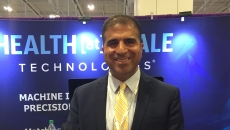Quality and Safety
Dr. Mohammed Saeed from the University of Michigan Medical School discusses how the artificial intelligence tools can help improve provider practice patterns, potentially shielding patients from the harms of inappropriate or unnecessary care.
NEC will be deploying a fall detection and alert system.
By having deep conversations about artificial intelligence's capabilities and limitations, the nine-state health system hopes to help its clinical and IT leaders enable a more responsible path forward for AI deployments.
The interoperability organization's Consumer Voices Workgroup says its recommendations – for improving patient access, use and sharing of data – are 100% achievable using current technology.
Julie Eastman, RN, has been associate chief information officer at the Orange County health system for the past 18 months. With the promotion, she'll supervise IT operations and lead efforts on telecom, biomedical engineering and more.
Health systems able to offer this will not only be better positioned to survive external pressures, says one artificial intelligence expert, but will also help set the bar for critical best practices for future patient-provider relationships.
The HIPAA-compliant video analytics platform will be layered on UMC’s existing security systems. When it identifies guns, trained experts verify the threat and can dispatch alerts and intelligence to the police.
Data integrity and model validity are also must-haves, says an expert, who offers his ideas on a "clean data" mentality and explains why explicit consent is essential for training algorithms.
In a study published in Nature, Google revealed that its generative AI technology answered medically related questions with 92.6% accuracy.
University of Texas researchers found that symptoms of certain diseases are more difficult for patients to communicate and doctors to observe over video. Other limitations mean little cost-reduction benefit from telehealth when compared to in-person care.








